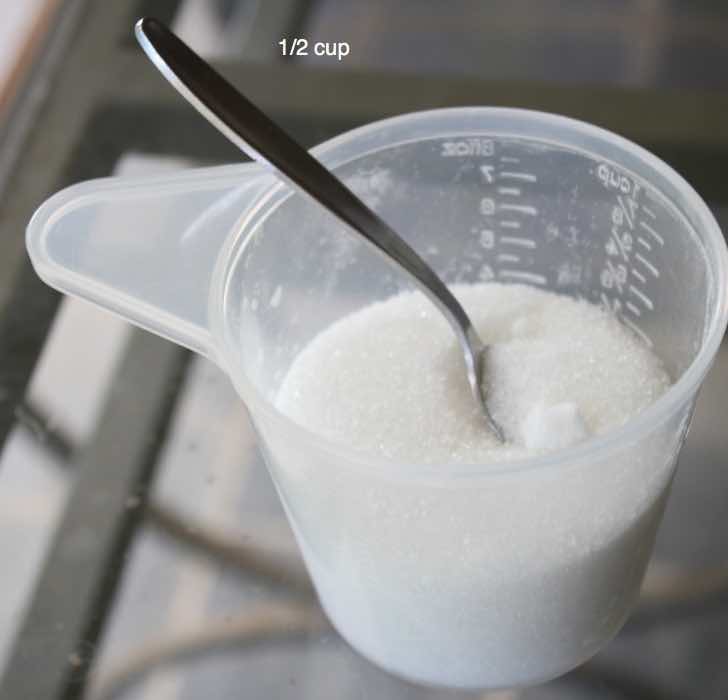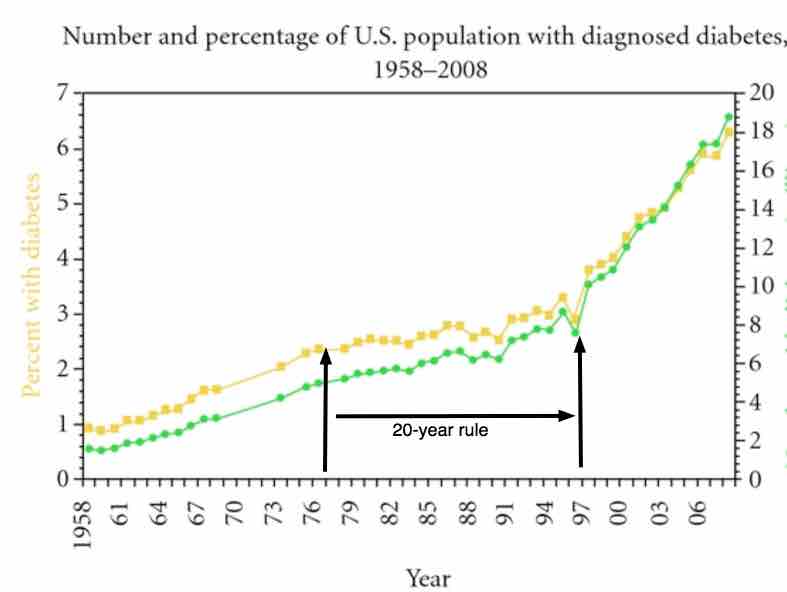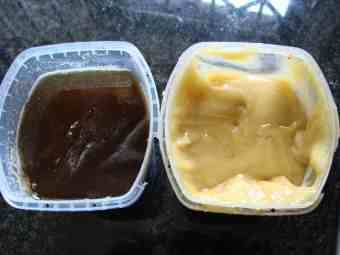- Bernard Preston homepage
- Carbs in the life of a Believer
- How Much Sugar in the Life of a Believer
How much sugar in the life of a believer?
How much sugar in the life of a believer is a question to be faced.
Good morning and welcome to this the fourth and penultimate day on the influence of carbs on the wellbeing of believers. It is getting decidedly more difficult now. This talk is entitled “how much sugar?”
My starting point is that there are worldly and heavenly standards regarding food just as in the rest of a Christian’s walk with the Lord. The former the Devil uses to cripple our lives; the latter bring life and health. Such is the complexity of nutrition that the margins are very blurred.
How much sugar in the life of a believer?
 24 teaspoons of sugar in half a cup.
24 teaspoons of sugar in half a cup.Dr George Campbell
Dr George Campbell was a profound thinker, researcher and physician specialist based for much of his professional life at King Edward VIIIth hospital in Durban; a world-renowned doctor. Diabetes was his dedicated area of interest and in particular the effect of changes of diet on the health of rural Indians and Zulus as they migrated to the cities in KZN.
Sucrose of course is not a starch; but all carbs are made up of long chains of sugar molecules. They all end up mainly as glucose passing through the liver.
Indians you well know were brought to SA as indentured labourers to harvest sugarcane.
Whilst working very hard in the fields, consuming large amounts of sugar by chewing the cane for energy they were generally pretty healthy despite their love of white rice.
Rural Zulus ate unrefined mealiemeal for starch and even today diabetes affects less than 4% of the population living in the country. However discovering the charms of refined grains in the cities, both wheat and maize, they began to add large amounts of sugar and salt and to their food to give it flavour; and to the white rice too.
With the move to Durban both Indians and Zulus began to eat fibre-poor rice, cake flour and refined maize meal; more, they both began to consume large amounts of sugar and salt. As we all know once refined, grains lose their flavour; they become tasteless.
How would a cake taste without the sugar?
Dr Campbell’s research on these people led him to propose what today is known as the “twenty year diabetes rule."
Consuming 20 tsp of sugar per day for twenty years will almost certainly guarantee that we will begin to suffer from insulin-resistance and type 2 diabetes.

Prof George Lundberg
Eminent pathologist, Prof George Lundberg adds grist to the mill. This no doubt will seem utterly over the top and extreme; until you read his credentials.
He was a pathologist; he spent his whole life dealing with what kills people. There's no doubt from which pantry sugar comes in his opinion.
Do not consume sugar either added to anything, in home-cooked food or restaurant meals; nor in soft drinks, fruit juices and pastries. Avoid desserts.
Watch out for hidden sugar in processed foods.
- Prof George Lundberg MD
We Christians are not exempt. As Arthur C. Clarke, knighted for his contribution to science remarked, "Human judges (to which we could add God) can show mercy but against the laws of nature there is no appeal." Overconsumption of sugar is deadly. It raises triglycerides in the blood, produces inflammation and along with other refined starches is the cause of silent fatty liver disease; for which there is no medically-proven treatment. It is terminal.
Six teaspoons per day
The Heart Association recommends no more than about 6 tsp of sugar per day, about 30g which is probably reasonable provided you are not prediabetic. Personally we try to limit ourselves to only three but then we do consume a little natural honey too; another few teaspoons.
But South African children are now the second highest consumers of colas in the world. One in eight adults are diabetic. Is sugar from the Devil’s Pantry? I think so. Dr Campbell thought so; so did Professor Lundberg.
"Women who consumed 1 or more sugar-sweetened beverages per day, compared with those drinking 3 or fewer servings per month had nearly double the risk of developing liver cancer."
- Journal of the American Medical Association[3]
Natural honey as an alternative
 Most natural honeys will set very quickly.
Most natural honeys will set very quickly.I’d like to end this with a little look at honey. It consists of a mixture of glucose and fructose, two highly glycemic sugars.
It’s pure mystery at this stage but German researchers after studying eight different honey varieties were astonished to find that five out of six of the naturally produced by small beekeepers had a low glycemic index[1]; they have little influence on blood glucose.
In fact diabetics enjoying a little natural honey every day actually have lower fasting blood glucose in the morning.
But commercial honey once it has been processed has an extremely high glycemic index, greater than that of sugar. Natural pollen is removed and important enzymes are destroyed by heating; and over fifty percent of that on supermarket shelves today is adulterated with high fructose corn syrup and other chemicals which are much cheaper to produce.
Smell your honey before tasting it; does it have what foodies describe as “floral tones?” Or is it just sickly sweet? The natural product of the hive contains volatile substances that give it the fragrance of a million flowers; once processed they are lost and it becomes as dull and lifeless as a teaspoon of sugar.

Orthorexia
I would like to finish off today with a few thoughts on orthorexia.
It’s a first cousin of better known anorexia. It refers to the unhealthy obsession with eating only pure food, however that is defined.
As you no doubt have noticed, I tread warily knowing I could easily fall into this unhealthy fascination of nutritious food. The first sure sign that you are on thin ice is when you start to refuse invitations to dine with others because they might have added this or that to their cooking; or insisting that you can take your own nosh.
Orthorexia is a serious psychological illness; despite that, there are certain so-called “foods” that I will not touch. But I do believe we should gladly be able in the main to enjoy many that we find questionable, without guilt on what I call high and holy days.
Pancakes plied with syrup on Shrove Tuesday and a slice of chocolate cake at a friend’s birthday party are not likely to be our downfall; anxiety about them could be.
Ludwig van Beethoven and cirrhosis of the liver
Recent research of the genes and other remnants in locks of Beethoven's hair has determined that arguably the greatest musician of all time died at the tender age of 56 of cirrhosis of the liver.
There are two causes of cirrhosis; large amounts of alcohol and "chronic excessive refined carbohydrate" consumption.
What remains uncertain is whether it was from too much wine or indulgences in pastries, cold storage potatoes and other sugary delectables; they all contribute to steatohepatitis as it is known.
Worse perhaps it was quite likely over-indulgence in both that killed him. With chronic excess carbs from our food the glucose is trapped in the liver, the surplus stored as lipids. Fatty hepatic disease is the consequence. The only proven treatment interestingly is beeswax; and a severe cutback of all sugar, starches and alcohol. Otherwise it is terminal; it took his life, robbing the world of at least another two decades of his creative genius.
- Instead indulge yourself for seven minutes of total bliss in Beethoven's Fifth symphony[2].
The saccharine disease
But some who are suffering from what Dr Campbell named “the saccharine disease” may feel called to give up sugar for ever; as an alcoholic would refrain from all booze. It is I would suggest definitely from the Devil’s pantry; in limited quantities it is probably fine.
How much sugar in the life of a Christian is a question to be faced. Certainly no more than 10tsp per day on average; about a cup and a half per week. I think an occasional indulgence is probably okay; Professor Lundberg would have vehemently disagree.
We started off this series with the prayer of Sue van Niekerk. Take only home what you discern is of God; and that which your spirit suggests is just the fanaticism of Bernard Preston you can gladly leave on the table. If as Calvin Cook used to say, some of this leaves you with a stone niggling in the shoe then I would suggest that perhaps the Lord is at work.
Goodbye and God bless as you ponder these deep and important matters; they will make the difference between you being a sickly person at 75 or a vigorous and busy 90-year old still joyfully serving our Heavenly Father.
"42% of cancers, including common ones such as colorectal and postmenopausal breast malignant tumours are considered obesity-related."
- Medscape
How much sugar in the life of a believer?
How much sugar in the life of a believer is acceptable? The role it plays in obesity and diabetes is plain for all to see; less obvious is what it does to the brain.
- Glycaemic and insulinaemic properties of some German honey varieties.
- Beethoven's Fifth symphony. Web: https://tinyurl.com/f3y7sm67
- Sugar-Sweetened and Artificially Sweetened Beverages and Risk of Liver Cancer and Chronic Liver Disease Mortality
When browsing use right click and "Open Link in New Tab" or you may get a bad gateway signal.
Day 1: Carbs in the life of a believer
Carbs in the life of a Believer shows how modern milling has taken natural grains and turned them into pseudo-foods from the Devil's Pantry.
Day 2: Potatoes in the life of the believer
Part 2 in this series concerns the place of potatoes in the life of the Believer. Gaining some understanding of the meaning of retrogradation helps in the management of obesity.
Day 3: Believers can enjoy green mealies
There is abundant scientific evidence that whole grains are extremely beneficial; they are straight from God's Pantry. But once refined much of the goodness has been extracted and they become highly glycemic; they raise our blood-glucose alarmingly.
So Believers can enjoy green corn on the cob but will have difficulty finding true wholegrain maizemeal for their porridge, grits and putu.
Day 4: How much sugar in the life of a Believer?
In small amounts sugar is probably fine. There is no consensus on what is acceptable. Over 70 tsp per week is almost certainly too much; that's about one cola per day.
Day 5: What about cake flour for believers?
I know this has been a difficult series of talks for you. Such are the inroads that the Devil has made into our thinking and practice that we have not seen through his deception; refined cornmeal, sugar and now cake flour.
Newsletter
Our newsletter is entitled "create a cyan zone" at your home, preserving both yourself and Mother Earth for future generations; and the family too, of course. We promise not to spam you with daily emails promoting various products. You may get an occasional nudge to buy one of my books.
Here are the back issues.
- Lifestyle and ideal body weight
- What are ultra-processed foods?
- Investing in long-term health
- Diseases from plastic exposure
- Intensive lifestyle management for obesity has limited value
- A world largely devoid of Parkinson's Disease
- The impact of friendly bacteria in the tum on the prevention of cancer
- There's a hole in the bucket
- Everyone is talking about weight loss drugs
- Pull the sweet tooth
- If you suffer from heartburn plant a susu
- Refined maize meal and stunting
- Should agriculture and industry get priority for water and electricity?
- Nature is calling
- Mill your own flour
- Bake your own sourdough bread
- Microplastics from our water
- Alternative types of water storage
- Wear your clothes out
- Comfort foods
- Create a bee-friendly environment
- Go to bed slightly hungry
- Keep bees
- Blue zone folk are religious
- Reduce plastic waste
- Family is important
- What can go in compost?
- Grow broad beans for longevity
- Harvest and store sunshine
- Blue zone exercise
- Harvest and store your rainwater
- Create a cyan zone at your home
Did you find this page interesting? How about forwarding it to a friendly book or food junkie? Better still, a social media tick would help.
- Bernard Preston homepage
- Carbs in the life of a Believer
- How Much Sugar in the Life of a Believer
Address:
56 Groenekloof Rd,
Hilton, KZN
South Africa
Website:
https://www.bernard-preston.com